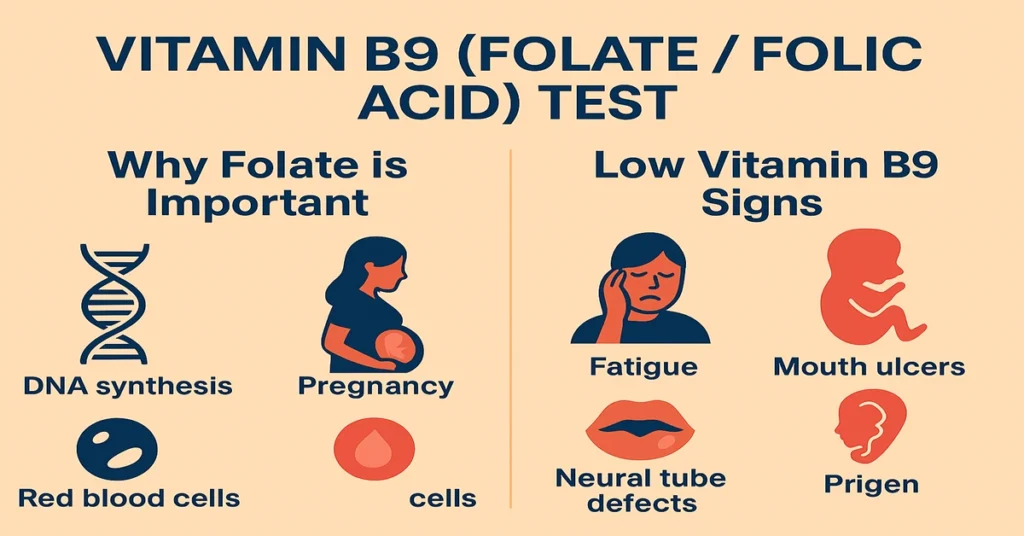What is Vitamin B9?
Vitamin B9, also known as Folate (natural form) or Folic Acid (synthetic supplement form), is a water-soluble B-complex vitamin.
It plays a key role in cell growth, DNA synthesis, red blood cell formation, and proper development of the nervous system — especially in unborn babies during pregnancy.
This vitamin is essential for producing and repairing DNA and RNA (the body’s genetic material), making it crucial for tissue growth and cell function.
It is one of the most important vitamins during pregnancy, as it helps prevent neural tube defects such as spina bifida and anencephaly in developing babies.
Where is Vitamin B9 Produced in the Body?
- The human body cannot produce Vitamin B9 in adequate quantities.
- It must be obtained through diet (leafy greens, citrus fruits, legumes, fortified cereals) or supplements.
- Small amounts are produced by gut (intestinal) bacteria, but this is not enough to fulfill daily requirements.
Because it is water-soluble, any extra Vitamin B9 that the body doesn’t use is excreted in the urine — so it needs to be replenished regularly through food.
Main Functions and Importance of Vitamin B9
Vitamin B9 is essential for multiple vital functions:
1. DNA and RNA Synthesis
Folate is necessary for DNA and RNA formation, which controls cell growth and division.
This is especially important for growing tissues, such as during pregnancy, infancy, and adolescence.
2. Red Blood Cell (RBC) Production
It works with Vitamin B12 to produce healthy red blood cells.
Deficiency can lead to megaloblastic anemia, a condition where RBCs are large and immature, causing fatigue and weakness.
3. Neural Tube Development (in Pregnancy)
Folate is critical for fetal brain and spinal cord development.
A deficiency in early pregnancy can cause neural tube defects such as:
- Spina bifida (spinal defect)
- Anencephaly (brain development defect)
That’s why doctors recommend folic acid supplements before conception and during pregnancy.
4. Brain and Nervous System Health
Vitamin B9 helps in the production of neurotransmitters, supporting mental clarity, memory, and mood regulation.
It also helps reduce homocysteine levels — an amino acid linked to heart and nerve health.
5. Amino Acid Metabolism and Heart Health
It works with Vitamin B12 and B6 to break down homocysteine, preventing heart disease and supporting smooth metabolic function.
Causes of Low Vitamin B9 Levels (Deficiency Causes)
Deficiency can result from dietary, medical, or genetic causes, such as:
- Poor dietary intake, especially low consumption of leafy greens, fruits, or legumes.
- Alcoholism, which interferes with absorption and metabolism.
- Pregnancy, due to increased body requirements.
- Malabsorption disorders such as celiac disease or Crohn’s disease.
- Certain medications, including methotrexate, phenytoin, and sulfasalazine.
- Genetic mutations, such as MTHFR deficiency, affecting folate metabolism and conversion.
Symptoms of Vitamin B9 Deficiency
When Vitamin B9 levels are low, it affects red blood cell production and tissue repair.
Common symptoms include:
- Megaloblastic anemia (large, immature red blood cells)
- Fatigue, weakness, and pale skin (pallor)
- Irritability, headache, or dizziness
- Glossitis (red, swollen tongue)
- Mouth ulcers
- Poor growth and delayed development in children
- During pregnancy: risk of neural tube defects (spina bifida, anencephaly) in the baby
In severe deficiency, symptoms may overlap with Vitamin B12 deficiency, so both are often tested together.
Causes of High Vitamin B9 Levels
High Vitamin B9 levels are usually due to excess supplementation or fortified foods.
Natural food sources rarely cause excess levels.
Other possible reasons include:
- Overuse of folic acid tablets
- Fortified processed foods
- Excess supplementation during pregnancy (beyond prescribed limit)
Symptoms of High Vitamin B9 (Toxicity)
Vitamin B9 is generally safe, but very high doses can lead to:
- Masking of Vitamin B12 deficiency, which can delay diagnosis and cause nerve damage
- Sleep disturbances or insomnia
- Digestive discomfort (bloating or nausea) in high supplement doses
Hence, supplementation should always be guided by a doctor.
Normal Range (Reference Values)
| Parameter | Normal Range |
|---|---|
| Folate (Vitamin B9) | 2.7 – 17.0 ng/mL |
| Deficiency | < 2.0 ng/mL |
Note: The exact reference range may vary depending on the laboratory method used.
Sample Type and Testing Method
- Sample Type: Blood (serum or plasma)
- Purpose: To measure folate levels in the bloodstream.
- Fasting: Usually not required, unless the doctor orders additional vitamin or metabolic tests.
Test Preparation
To ensure accurate Vitamin B9 test results:
- Avoid vitamin supplements (especially folic acid or multivitamins) for 24–48 hours before the test.
- Inform your doctor about any medications (especially anticonvulsants or chemotherapy drugs).
- Stay hydrated before your blood sample is taken.
- Fasting is optional unless advised otherwise.
When to Consult a Doctor
You should see a doctor if you notice:
- Persistent fatigue or weakness
- Mouth ulcers or swollen tongue
- Pale skin or signs of anemia
- Numbness, mood swings, or memory issues
- If you are pregnant or planning pregnancy (for folic acid supplementation)
Doctors may recommend:
- A Folate (Vitamin B9) blood test
- Vitamin B12 test (done together to rule out combined deficiency)
- Folic acid supplementation, dietary improvements, or genetic testing if needed.
Important Word Explanations
| Word | Meaning |
|---|---|
| Folate | Natural form of Vitamin B9 found in foods. |
| Folic Acid | Synthetic form used in supplements and fortified foods. |
| Megaloblastic Anemia | Type of anemia with large, immature red blood cells. |
| Neural Tube Defect | Birth defect affecting brain or spinal cord formation. |
| Homocysteine | Amino acid that can damage arteries if not broken down properly. |
| MTHFR Mutation | Genetic variation that affects folate metabolism and conversion efficiency. |
~END~

